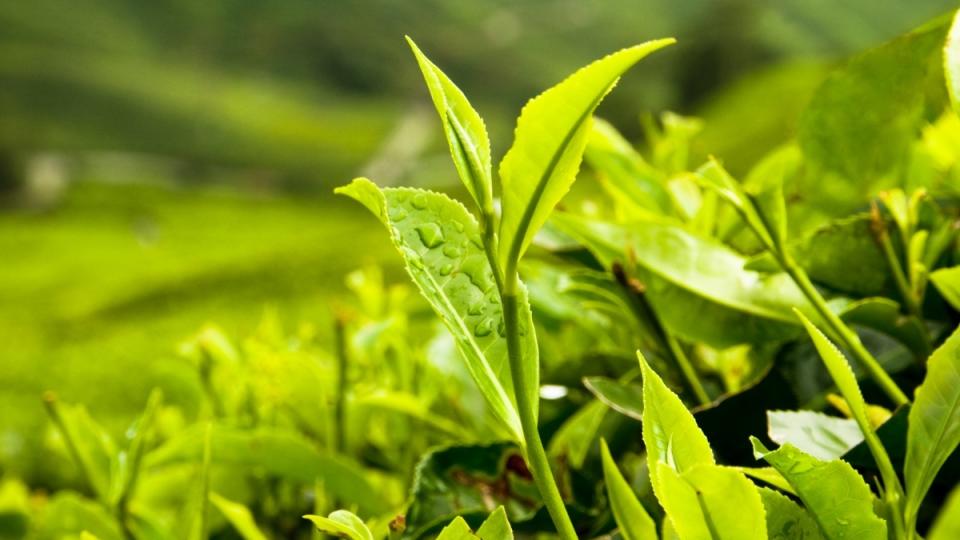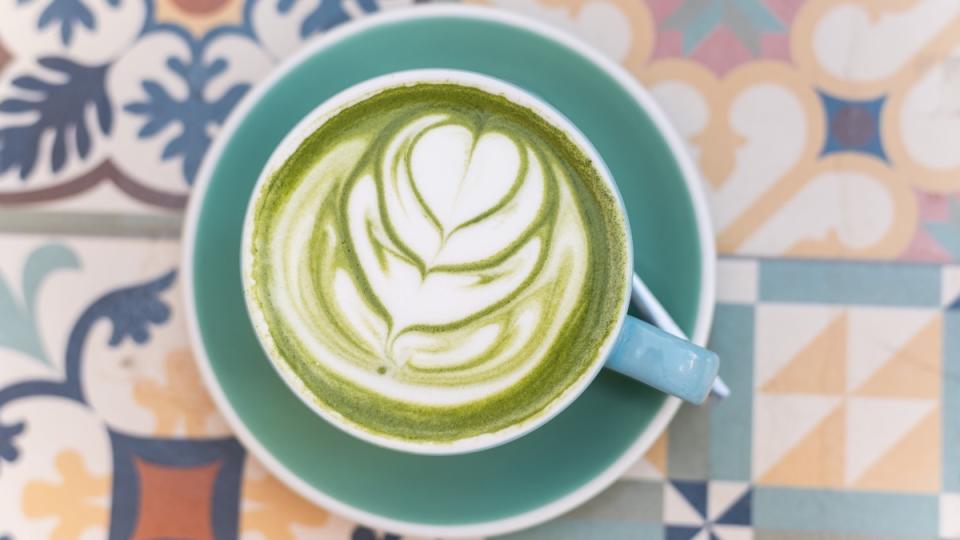Matcha vs Green Tea: Experts Settle the Debate on Which Is the Healthier Brew
When it comes to what we’re sipping on all day, we know that it’s best not to drink our calories and that water is our friend. However, some days (okay, maybe every day) we crave more than plain H2O. Fortunately, there are plenty of flavorful drinks that also deliver health perks, like green tea and matcha lattes. But should we be choosing one over the other? In the battle of matcha vs green tea, is one far superior?
“At first glance, they may seem like identical twins, both hailing from the esteemed Camellia sinensis plant species,” notes Naheed Ali, MD, PhD, author of Living with Metabolic Syndrome. “But once you peek under the hood, you'll find some key distinctions that can impact everything from the flavor profile to the specific health-boosting benefits.” Read on to discover the key differences between matcha vs green tea, plus the unique perks of these sips.
Matcha vs green tea
While both matcha and green tea come from the same plant, the preparation and the way you enjoy them are different. “Green tea leaves are picked and then fermented, during which the leaves change color and appear darker,” explains Lena Bakovic, RDN, CNSC, a registered dietitian with Top Nutrition Coaching.
Like with black tea or herbal tea, the leaves are steeped and then discarded before the tea is consumed. “The flavor of green tea is fairly mild, however can become bitter if steeped too long,” says Bakovic, adding that green tea is typically less expensive than matcha. (Click through to learn why green tea is one the best teas for a sore throat.)

georgeclerk/Getty
Matcha, on the other hand, is a “finely milled green tea powder [that] goes through a rather fascinating production process,” Dr. Ali shares. “The plants are actually shaded from sunlight in the weeks leading up to harvest, which increases their chlorophyll and amino acid content. After picking, the nutrient-dense leaves are promptly stone-ground into that vibrant emerald powder we all know and love frothing into lattes.”
Indeed, while you don’t drink the green tea leaves, you do consume the matcha powder. This affects the flavor, which Dr. Ali describes as “a more robust, umami-rich flavor with delightfully savory notes you won't find in standard brewed green tea.”
Is there caffeine in green tea?
The short answer is yes, there is caffeine in green tea. But the caffeine content is another factor that sets matcha and green tea apart. “One key difference between matcha and green tea is the respective caffeine content of the two beverages,” affirms Bakovic. Depending on the quality of the matcha powder and how much you're putting in your latte (which is usually 1 to 2 tsp.), it can contain anywhere from 40 to 180 mg of caffeine per cup. Green tea is generally less caffeinated. It's going to deliver closer to 30 mg of caffeine per 8 ounces.
How do each of these sips stack up to a good old cup of joe? An 8-ounce cup of brewed coffee typically contains around 95 mg of caffeine. But it may deliver as much as 140 mg, depending on the brew. However, because of the antioxidants and amino acids found in matcha, especially calming L-theanine, the energy boost that matcha delivers is usually more prolonged and sustained than the boost you would get from coffee.

Matcha vs green tea health benefits
Matcha and green tea contain all the same beneficial nutrients, albeit in different concentrations. Here we break down some of the most powerful nutrients and the health benefits they deliver.
1. Antioxidants ward off oxidative stress
“The main beneficial compounds of green tea are its antioxidants,” Bakovic says. “The antioxidants contained within green tea are called polyphenols, and more specifically catechins. Antioxidants help scavenge cancer-producing free radicals from the body.” They also help protect against oxidative stress. This is a cell-damaging process that can lead to premature aging and a variety of illnesses. Indeed, oxidative stress has been linked to conditions such as Alzheimer's, Parkinson's and multiple sclerosis.
2. EGCG protects your heart
“Epigallocatechin gallate, or EGCG, is the most prevalent and potent catechin found in green tea,” says functional medicine physician Shivani Amin, MD. EGCG has been studied extensively and linked to numerous health benefits with regular consumption.
“EGCG can help lower LDL cholesterol and prevent the formation of blood clots, reducing the risk of heart diseases,” Dr. Amin explains. “It can boost metabolic rate and increase fat burning, aiding in weight loss. And the compound may protect against neurodegenerative diseases, like Alzheimer's and Parkinson's.” What's more, a review in Frontiers in Nutrition confirmed that this potent catechin likely has powerful anti-cancer properties.

Related: Does Green Tea Help With Bloating? Yes! Plus, It Speeds Weight Loss + Helps Blood Sugar
3. L-Theanine sharpens focus
“This amino acid promotes relaxation without drowsiness and can enhance concentration and memory,” Dr. Amin explains. Indeed, a recent study published in the Journal of Medicinal Food found that L-theanine improves attention and working memory. As a result, it contributes to an improvement in overall cognitive function over time. (Click through for more ways to get rid of brain fog fast.)
L-theanine is also known for ushering in a sense of calm. How? Studies show it blunts spikes of the stress hormone cortisol. And in happy news, green tea contains significantly more l-theanine than black tea, according to a study in Pharmacognosy Magazine. That makes cozying up with a cuppa a smart bet when you're feeling stressed.
4. Chlorophyll flushes toxins
“Having high levels due to the shading process prior to harvesting, chlorophyll is known to detoxify the body by binding to and eliminating toxins,” Dr. Amin says. This plant pigment is responsible for the bright green hue of matcha as well as green vegetables. It's thought to also deliver antioxidant power and anti-aging capabilities.
Matcha vs green tea: Which is healthier?
Now that you know a little more about these popular brews, which should you sip to enjoy the most perks? “In determining which is the healthier choice, matcha arguably stands out due to its superior concentration of antioxidants and vital nutrients,” says Dr. Amin. “This is a reflection of its distinct processing and preparation. The whole leaf is consumed, maximizing the intake of beneficial compounds like the anti-cancer catechin EGCG, the stress-relieving amino acid L-theanine and the detoxifying agent chlorophyll.” (Have some leftover tea? Click through to learn how matcha benefits the skin, too.)

That said, there’s certainly no need to toss out your green tea bags. “With its leaves simply dried and steeped, it still delivers a solid supply of antioxidants, soothing amino acids like L-theanine and other beneficial plant compounds,” Dr. Ali says. Need another reason to keep drinking green tea? Unlike matcha, which is usually sipped as a latte that includes milk and perhaps a sweetener, green tea can be enjoyed as a simple brew that’s just as hydrating as a glass of water.
For more delicious, health-boosting brews:
Does Green Tea Help With Bloating? Yes! Plus, It Speeds Weight Loss + Helps Blood Sugar
These Teas Ease Allergies Naturally + the Timing Trick That Boosts the Benefit
The Best Tea for a Sore Throat? Docs Reveal Their Top 6 Picks That Soothe Fast
This content is not a substitute for professional medical advice or diagnosis. Always consult your physician before pursuing any treatment plan.
